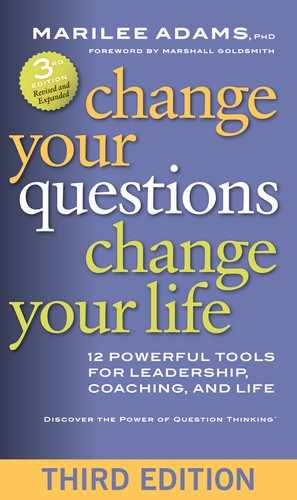Tool 3: Put the Power of Questions to Work
This tool has two parts: The first (A) has to do with becoming more aware and effective at asking internal questions (the ones we ask ourselves); the second (B) has to do with becoming more prolific and effective at asking interpersonal questions (those we ask others).
A: INTERNAL QUESTIONS
Purpose: To become more aware of your Self-Qs and to increase the quantity and quality of your internal questions, the ones you ask yourself.
Discussion: Ben starts to change once he realizes that the questions he asks himself—both Learner and Judger—have a huge impact on the results he’s able to achieve. He then begins refining his questions by applying the tools in the Question Thinking system.
All our actions are driven by internal questions that we may or may not be aware of asking ourselves. Even an ordinary activity such as getting ready to go on a vacation is driven by questions. For example, think of a time when you were packing for a trip. You went to your closet, your bureau, and your medicine cabinet and asked yourself questions such as: What climate(s) will we be in? Do I need evening clothes as well as casual ones? What packs well and doesn’t wrinkle? And, How long will we be gone? You answered your questions first in your mind by making a decision, followed by doing something about it. You selected some items and put them in your suitcase.
As you think about packing for for a trip, notice that you would ask yourself very different questions depending on whether you were going, say, for an African safari or a lovely week in Paris. And what if you arrived at your destination and discovered you’d forgotten something? That just means you forgot to ask yourself about that item when you were packing for your trip.
These two practices for increasing your awareness of Self-Q’s are very simple. The first turns your attention to discovering how prevalent internal questions are in your life. The second focuses on the types of questions you ask yourself and the kinds of experiences and results they produce.
Practice 1: When you get up tomorrow morning, do a little personal question research. Note what questions you’re asking yourself as you get dressed. Then, from time to time throughout the day, ask yourself what questions might be driving your behavior in that particular situation, both in terms of your own actions and in terms of your interactions with others. It may take some patient observing to recognize those behavior-generating questions, but stay with it until you are able to recognize the influential role that Self-Qs play in your life.
Practice 2: As a second piece of question research, notice your responses to situations that come up throughout the day. Is your first thought a statement (an answer), or is it a question? If your first thought is a statement, experiment with changing it into a question; notice how shifting from a statement to a question changes your mood, actions, or interactions. Notice any correlations between your statements or questions and the kinds of experiences and results they produce.
B: INTERPERSONAL QUESTIONS
Purpose: To become more aware of the questions you ask others and to be mindful of their possible impact. Also, to increase the quantity and quality of the questions you ask.
Discussion: Throughout Ben’s story, Joseph helps him to understand the importance of asking questions in order to:
• Gather information
• Create understanding and learning
• Search for and challenge assumptions
• Build, improve, and sustain relationships
• Clarify and confirm listening
• Stimulate creativity and innovation
• Resolve conflicts and create collaboration
• Set goals and create action plans
• Explore, discover, and create new possibilities
Practice 1: Approximately what is the ratio of questions you ask compared to statements you make (your ask/ tell ratio)? Do your communications with others involve more telling than asking? In at least one conversation today, practice asking questions much more and telling or advising much less. What do you notice from this experiment?
Practice 2: Recall a time when a particular question made a positive difference in your personal or professional life. It could have been a question you asked yourself or one that someone asked you. What was the question? What was the result? And what was it about the question that made such a difference?
